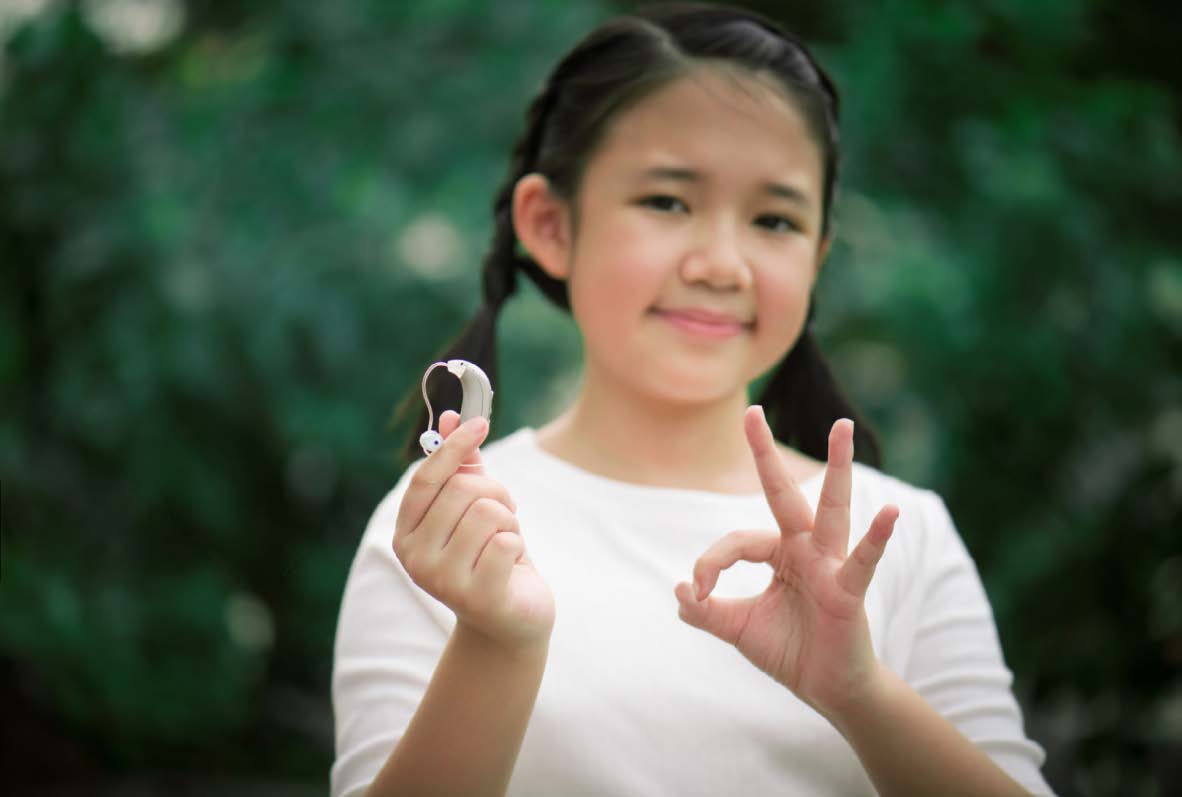CARING FOR YOUR CHILD'S HEARING HEALTH AT HOME

ASHA OFFERS GUIDANCE FOR MAINTAINING HEARING DEVICES, IMPROVING
As American families shelter in place due to COVID-19, children with hearing loss may need additional help at home, according to the American Speech-Language-Hearing Association (ASHA). The association offers parents this guidance:
1. MAKE SURE YOUR CHILD IS USING THEIR HEARING AIDS AND COCHLEAR IMPLANTS AS MUCH AS POSSIBLE.
Hearing amplification should be turned on during waking hours, whether a child is engaged in educational or leisure activities. Keeping device(s) on a child's ear(s) and in good working order gives that child the best access to daily communication, language, and learning. The more exposure to language input, the better: It takes children 20,000 hours of listening before their brains are ready to learn to read. Keeping hearing aids or cochlear implants turned on can help children develop other communication skills, too–including written communication. It also allows them to participate to their fullest extent in interactions at home and virtually..
2. PRACTICE GOOD COMMUNICATION HABITS, AND PROMOTE TOGETHERNESS
- Everyone in the family can engage in good communication habits, helping the child with hearing loss while also strengthening family bonds:
- • Make sure you are in the same room before you start talking. This offers a child the best opportunity to hear your voice while also providing access to visual cues such as facial expressions and body language. Does your child have a phone? Send them a text to let them know you want to talk. You'll capture their attention and protect your vocal cords!
- •Speak one at a time (as much as possible) during meals/activities. If a child is too young to understand this concept, incorporate a talking stick–designating the holder of the stick as the only person who can talk. The use of the stick will make it easier to follow the conversation and also helps teach a key social skill of turn taking. Making a talking stick is also a great arts-and-crafts opportunity for young children at home (Do a web search for numerous online examples).
- •Turn on closed captioning. Watching Frozen for the 100th time? Even if your child knows every line of the movie by heart, practicing reading along can help them keep up with new dialogue when you finally switch movies or shows. Most streaming services offer the option for closed captions or subtitles.
- •Set aside time for regular face-to-face activities. These could take the form of a board game or meal together. During this time, make sure all screens are down and eyes are up, so everyone can fully capture what is being communicated.
3. PRIORITIZE REGULAR CARE, ROUTINE, AND PREPAREDNESS.
- Steps like the ones below can make maintaining and caring for your child's hearing health from home for an uncertain period of time more manageable:
- •Add a daily "listening check" to your vmorning routine. It is important to know if hearing devices are working properly. Otherwise, your child might not be benefiting from wearing them. A video and step-by-step guide on how to perform a listening check is available from the National Center for Hearing Assessment and Management.
- •Add hearing aid or cochlear implant batteries to your stay-at-home preparedness list. Make sure that your child has enough batteries for at least three months. Although you may not be able to see your child's audiologist in person right now, they may have some suggestions via phone or email about where you can stock up on batteries. Check the size before ordering–not all hearing aid or cochlear implant batteries are the same.
- •Keep a hearing journal. Pick a time each week to jot down notes about your child's hearing (this doesn't need to be in a formal journal — notes on your phone work, too). Document what has or hasn't worked. For example: "Ben wore his hearing aids all week with no problem," "Ben misunderstood some of the conversation during our family lunch and refused to wear his hearing aids for the rest of the day," or "Ben threw his hearing aid in the bathtub. We used his dry aid kit and it seems to be working okay." Take note of audiologist and other doctors' appointments that may have been canceled during this time.
- •Once you get the all-clear by your state, reschedule your child's appointments. When you go to your next audiologist appointment, bring your journal. They will be eager to hear your account of how caring for your child's hearing health has gone, where you think matters stand, and any questions or concerns that you may have.
The American Speech-Language-Hearing Association is committed to ensuring that all people with speech, language, and hearing disorders receive services to help them communicate effectively. ASHA can guide you to resources to help you understand communication and communication disorders.
If you have concerns about your child's hearing but haven't had a hearing evaluation, visit the ASHA ProFind tool to find an ASHA-certified audiologist in your area. Make an appointment once it is safe to go out again. For more information about childhood hearing loss, visit asha.org/public
ABOUT THE AMERICAN SPEECHLANGUAGE-HEARING ASSOCIATION:
The American Speech-Language-Hearing Association is the national professional, scientific, and credentialing association for 211,000 members and affiliates who are audiologists; speech-language pathologists; speech, language, and hearing scientists; audiology and speech-language pathology support personnel; and students. Audiologists specialize in preventing and assessing hearing and balance disorders as well as providing audiologic treatment, including hearing aids. Speech-language pathologists identify, assess, and treat speech and language problems, including swallowing disorders. asha.org